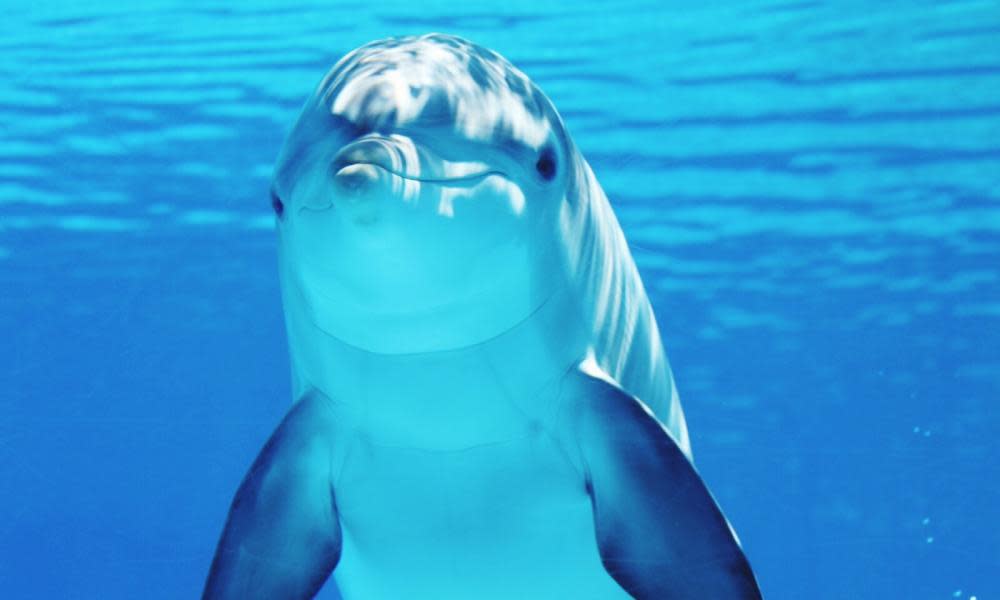Dolphins’ TV-watching habits confirm what gentle creatures they are. Unlike cats …

What, you’ll be wondering, should you get a dolphin for Christmas? Socks will clearly get regifted; the latest volume of Karl Ove Knausgaard’s memoir will lie damp and unread at the bottom of the ocean, while presents of fish are thoughtless – the dolphin equivalent of service-station flowers. One idea is a subscription to Radio Times (obviously laminated or in some other way water resistant).
This, at least, follows from research in Florida showing dolphins don’t just like TV but are discerning viewers. Until now dolphins’ viewing habits have not been studied, presumably because putting TV sets in water isn’t so much scientific research as the kind of genocidal cull that sets David Attenborough why-oh-whying at the end of Dynasties.
But now Florida biologists have played programmes on a screen through underwater windows for 16 bottlenose and rough-toothed dolphins. The intention was to improve the lives of rescued creatures by providing mental stimulation. Even deaf dolphins are captivated by the moving images – though, like us, they can’t understand what Danny Dyer’s on about.
It turns out that, like humans, dolphins like to put their melons (as marine biologists call their bisected heads) against the TV screen when interested. Me too if I can’t understand Tom Hardy and activating subtitles would take too long. But what’s really surprising is that dolphins don’t favour underwater programmes such as Planet Earth or SpongeBob SquarePants over nature documentaries set on the African savannah.
What can we learn from this research? The most interesting conclusion seems to be that dolphins confound the speciesist stereotype around telly viewing. Previous studies found that cats like watching potential prey on telly (which is why the cat video I bought a few years ago featured slow-moving bits of wool which, I found, had a more satisfying narrative arc than EastEnders). Dogs, being convivial, like shows about other dogs and humans. Chimpanzees enjoy watching scenes of conflict; and, you’d think, don’t balk at battle footage of flying faeces or the victor unashamedly masturbating. We don’t know what mice like to watch, possibly because they nibble through cables and get electrocuted, while goats are natural TV critics, preferring to eat TVs rather than watch them. Why do hyenas laugh so much? Not because they like sitcoms but because they’re evading their licence fees. The Bush Tucker challenge means that insect life eschews I’m a Celebrity for obvious reasons.
By contrast, dolphins, or so humans hubristically suppose, are like us, and unpredictable when it comes to TV tastes. When they are angry their heads jerk, emit bubbles or engage in what are called “jaw claps”. I do exactly the same thing when Gordon Ramsey “improves” a restaurant franchise or Piers Morgan engages with the #MeToo movement on This Morning, though my bubbles are much bigger.
Kelley Winship, one of the study’s authors, said it was no surprise that some dolphins seemed to like TV more than others, as their tastes vary as much as ours. Which means there’s much more research to be done into this fascinating field. Would dolphins enjoy more sophisticated adult fare such as, say, Dolphin Abbey or that Michael Keaton/Melanie Griffith movie Pacific Depths? If dolphins will never have opposable thumbs to operate conventional remote controls, might some form of sonar or thought-wave help them change channels when there’s a Panorama Brexit special on one channel and Champions League on another? Should Sky Sports show more water polo to satisfy the demands of new demographics? But most of all, when Channel 4 broadcasts, as it must, Underwater Dolphin Gogglebox (and, flippers crossed, Dolphin Gogglesprogs),, will we understand their TV viewing habits better than the human version? It seems unlikely.
• Stuart Jeffries is a freelance feature writer

 Yahoo News
Yahoo News 
